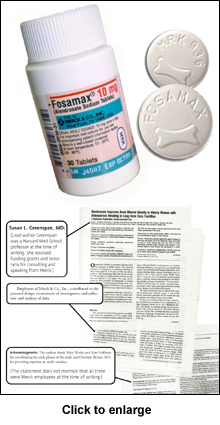“How do you get all this off-label use of drugs?” asks Merrill Goozner, director of the Integrity in Science Project and author of The $800 Million Pill. His answer: by paying doctors to prescribe the drug under the guise of testing. “That’s a huge aspect of these seeding trials,” Goozner says.
The resulting articles get out to more physicians — and the general public.
Seattle-based Berlex Laboratories, a subsidiary of Schering AG, paid for a study that ran in the May 26, 2005, issue of the New England Journal of Medicine, which concluded that its leukemia drug Leukine “decreased disease severity and improved the quality of life in patients with active Crohn’s disease.” The lead author, Joshua Korzenik of Harvard Medical School and Massachusetts General Hospital, is not only a paid consultant for Berlex and a member of its speakers bureau, but he also co-owns the patent behind the drug.
Korzenik says that he went to great lengths to “create a firewall” to protect the integrity of that study, which he and a colleague initiated when he was at Washington University, in St. Louis. The university established two committees to review the study results and process, and it even sent the compiled data to the outside clinicians who oversaw the bulk of the trials for individual review. Since receiving the patent, Korzenik has removed himself from further involvement in any research or promotion of the product.
Korzenik’s precautions are unusual, but the situation is not. And now, on the basis of his article, Berlex is doing just what Goozner described: spreading the word to physicians by sponsoring a huge, multi-site clinical trial of Leukine on Crohn’s patients.
ADVERTISEMENT
 |
University for sale
Now that industry-sponsored research has become a predominant reality, a battle is under way for control of the process, the data, and the writing: the sponsoring companies want to keep as much control as possible, and many academic researchers, or their administrators, don’t trust them with it.
For the past several years, the pendulum of power has been swinging toward the corporations sponsoring the research, particularly in conducting clinical trials. Their sponsoring contracts have frequently put the corporation in control of the design and oversight of the trials — which often take place at several or even dozens of sites. In some cases the sponsor also maintains drafting or final approval of the article, and even control over which data is sent to the academic researcher, and which isn’t.
When that happens, “the design of the study … likely is selected by the drug company to achieve the best results,” says Dariush Mozaffarian of Brigham and Women’s Hospital and Harvard Medical School.
Nevertheless, two-thirds of medical-school-research administrators accept industry-sponsored clinical-trial contracts that forbid their scientists from altering the study design, according to a survey published last year in the New England Journal of Medicine, authored by Michelle Mello of the Harvard School of Public Health. Nearly that many accept contracts that do allow the sponsoring company to alter the design. Less than a third find it unacceptable for the sponsor to store the data and “release portions” to the school’s scientists, and half think it’s okay for the sponsor to write the article, as long as the academic researcher “may review the manuscript and suggest revisions.”
With such constraints imposed by industry and embraced by so many sponsoring academic institutions, how can the work of even the best-intentioned researcher be trusted? “I think it’s reasonable to be suspicious,” says Harold Sox, editor of Annals of Internal Medicine, one of the world’s top peer-reviewed medical journals. “People don’t have the time to read the fine print, looking for evidence that the researchers had freedom to be scientists.”
 Merck, for instance, appears to have controlled virtually everything about a 2002 Annals paper touting the use of alendronate, a/k/a Merck’s Fosamax, on osteoporosis. The article’s lead author was Susan L. Greenspan, then a Harvard Medical School professor and director of the Beth Israel Deaconess Osteoporosis Prevention and Treatment Center, and now with University of Pittsburgh Medical Center. But Merck paid for the recruitment and participation of 327 patients; Merck collected the data from 25 separate facilities; Merck employees took care of “coordinating the early phases of the study” — that is, the design and execution of the trials — and of “providing expertise in study conduct.” And Merck retained control and ownership of the research itself.
Merck, for instance, appears to have controlled virtually everything about a 2002 Annals paper touting the use of alendronate, a/k/a Merck’s Fosamax, on osteoporosis. The article’s lead author was Susan L. Greenspan, then a Harvard Medical School professor and director of the Beth Israel Deaconess Osteoporosis Prevention and Treatment Center, and now with University of Pittsburgh Medical Center. But Merck paid for the recruitment and participation of 327 patients; Merck collected the data from 25 separate facilities; Merck employees took care of “coordinating the early phases of the study” — that is, the design and execution of the trials — and of “providing expertise in study conduct.” And Merck retained control and ownership of the research itself.
Most of these procedural details are revealed in the Annals article’s disclosures and acknowledgments. But such qualifications to a study’s objectivity rarely appear where many people learn about the results: in news articles or on Web sites. In 2001 — the year before Greenspan’s article appeared — Fosamax barely topped $1 billion in sales; in 2003 it made $2.7 billion. (Greenspan did not return calls from the Phoenix.)